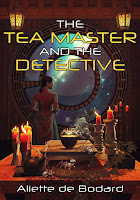Anyway, below are brief summaries links to my full reviews of the Hugo novellas. The only exception is for the Ted Chiang because that's in a collection that I haven't finished reading, so I've included my full (not especially long) review in this post. Order is that used by , out of laziness.
~
Anxiety Is the Dizziness of Freedom, Ted Chiang (Exhalation)
I really enjoyed this novella. It is possibly my favourite take on the manyworlds hypothesis/parallel timelines. The story follows a few different people as they interact with a new technology that allows them to communicate (via digital information only) with parallel timelines. The character driven story is interspersed with explanations of the technology, which I thought worked well and were not at all boring infodumps (though others might disagree). Overall, a very interesting and enjoyable read.
The Deep, Rivers Solomon, with Daveed Diggs, William Hutson & Jonathan Snipes
A key idea explored in The Deep is that if societal memory and specifically memory of trauma. The situation when the story opens is like this: one member of the wajinru people is the historian and only that person holds all the memories of past wajinru and events. ... As well as exploring how intergenerational trauma should be remembered, and by whom, The Deep questions whether it should be remembered at all, as Yetu grapples with some of these issues.The Deep was a good read, though I found it was a little slow to start and not the sort of book I could read quickly. I recommend it to people interested in the premise and, perhaps, to fans of merpeople.
The Haunting of Tram Car 015, P. Djèlí Clark
In this story, a couple of public servants are tasked with fixing the problem of a haunted tram car in an alternate-world Cairo. Hijinks ensue. In this world, djinn exist and have helped cement Cairo and Egypt's significance on the world stage, including from a technological standpoint. (The steampunky cover is a pretty good representation of the setting, in my opinion.) Our put-upon agents have to contend with identifying the possibly dangerous being possessing the tram and then have to safely remove it. And all this is set against the backdrop of a Cairo-centred campaign to give women the vote.
In an Absent Dream, Seanan McGuire
Lundy was a mildly unhappy child before she found her door and her particular fairyland wasn't everyone's idea of a good time. But she liked it and she made friends and she felt like she belonged. She even made several trips between the two worlds, which isn't something we've seen close up before. The story spans years as Lundy goes back and forth and is more the story of her transitions than the story of adventures had on the other side of a door. It's the story of choices made, of fair value — because that's what the Goblin Market is all about — and of family.
This Is How You Lose the Time War, Amal El-Mohtar & Max Gladstone
This is a remarkable book, told in a very poetic style, with chapters alternating between snippets of our characters’ lives and the letters they send each other. Although it is written as prose, one feels as though one is reading poetry. The use of imagery and metaphor is strong and frequent and the relationship between the characters shifts as they become more obsessed with each other as they learn more about the other.... It is the kind of book that demands your full attention to properly take in its words and worlds.
To Be Taught, If Fortunate, Becky Chambers
The premise of To Be Taught, If Fortunate is quite straightforward: a small group of scientist-astronauts are on a multi-year mission to investigate four habitable planets and catalogue whatever lifeforms and other interesting things they find. The novella is basically a chronicle of their journey and the main interest in the book is the explanations of science and discovery. ...I wouldn't call it fast-paced, by any stretch of the imagination, but it worked for me.








































.jpg)
























